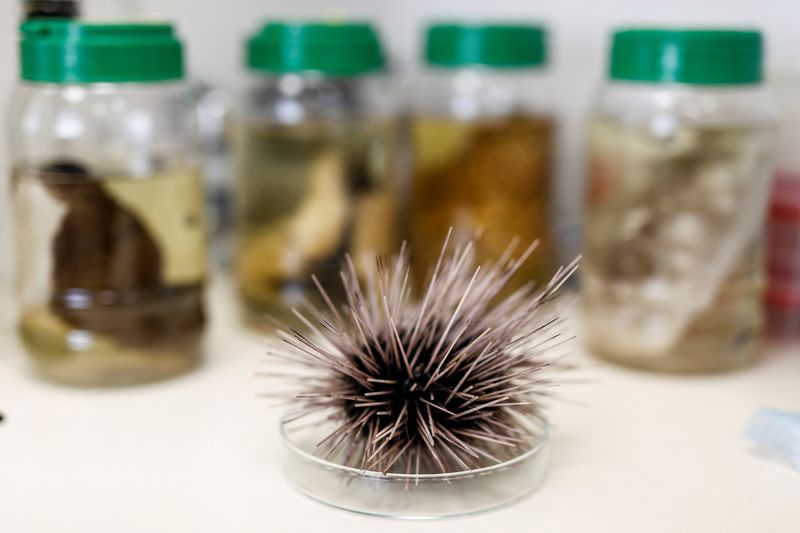By Hannah Confino and Ari Rabinovitch
TEL AVIV (Reuters) - A deadly epidemic that is spreading through the Red Sea has killed off an entire species of sea urchin in the Gulf of Aqaba, imperilling the region's uniquely resilient coral reefs, an Israeli research team has found.
The whole population of black sea urchins, a species known for helping keep coral reefs healthy in the waters also known as the Gulf of Eilat, was wiped out over a couple months, according to a team from Tel Aviv University.
Their findings, published in two peer-reviewed journals, cite mass mortality in other countries in the region, including Jordan, Egypt and Saudi Arabia.
The probable culprit is a disease-causing ciliate parasite that brings with it a fast death - perhaps the same one that has wreaked havoc on sea urchin populations in the Caribbean.
In just two days, a healthy Diadema setosum - a long-spined black sea urchin - becomes a skeleton with massive tissue loss, said lead researcher Omri Bronstein, from Tel Aviv University's Steinhardt Museum of Natural History and School of Zoology.
Some wash ashore dead. Others are eaten by fish, likely speeding up contagion.
The first signs of trouble appeared in the Mediterranean Sea, where the sea urchins have over the years invaded, probably through the Suez Canal, and made their home. Bronstein said there were reports several months ago from Greece and Turkey of sea urchin deaths.
While that was less concerning at first since they were an invasive species, the pathogen has now crossed back into the natural population in the Red Sea.
"There is nothing that can be done to stop this at the moment," Bronstein said.
But there is a "very narrow window", he said, to create an isolated population, or broodstock, of the sea urchins remaining elsewhere that could hopefully be reintroduced later on.
The researchers say a report to Israeli environmental authorities has been submitted and that emergency steps to protect the coral reefs are being examined.
Eilat, an Israeli resort town on the Red Sea's northern shore, is a popular spot for scuba diving. Scientists studying the area consider it a coral refuge.
The corals that settled thousands of years ago had to pass through a narrow strait to the south that acted as a thermal barrier, ensuring they are more resistant to temperature increases that are threatening reefs globally.

The sea urchins play an important role in maintaining balance by feeding on algae that would otherwise block sunshine and smother the reefs.
"Coral stand no chance competing with algae. That's why we need sea urchins," he said. "Without this species, as we've seen - this is not imagination, we've seen it happening in front of our eyes - it is not a good future."